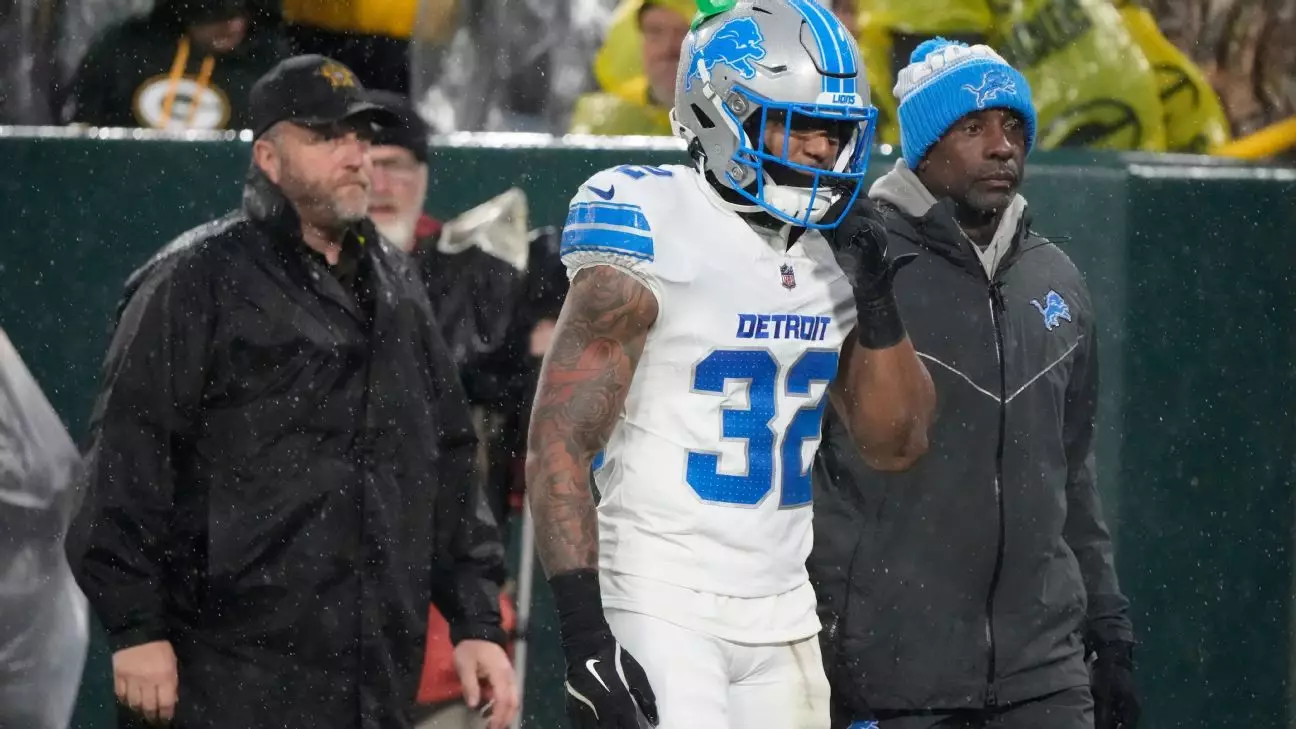The atmosphere surrounding the NFL can often be a pressure cooker, filled with expectations, aspirations, and the consequences of split-second decisions. This was a reality recently illustrated by the experiences of Detroit Lions defensive back Brian Branch, who found himself at the center of controversy following a late hit during a game against the Green Bay Packers. Such incidents are not uncommon in professional football, but they raise critical questions about player behavior, accountability, and the path to redemption amid public scrutiny.
In their 24-14 victory over the Packers, Branch faced the repercussions of a poorly timed tackle that marked a moment of high tension in a tightly contested game. Leading 7-3 at Lambeau Field, he delivered a late hit on Packers’ receiver Bo Melton, leading to his ejection. The incident overshadowed what could have been a hallmark performance, instead placing Branch under the microscope of media attention and fan outrage. Realizing the impact of his actions, he expressed remorse for his behavior, especially after receiving criticism from the officials and fans alike.
“I most definitely agree with the call,” Branch stated, recognizing that his focus must shift from aggression to technique. The dual penalties he faced—a consequence of the on-field incident followed by a mocking gesture towards the crowd—highlight the intense emotional responses athletes often confront, but it is crucial to separate intention from impact. Coaches and players emphasize the importance of maintaining composure, but the visceral nature of the game can lead to lapses in judgment.
Learning and Growth in the Face of Adversity
Such instances provide teachable moments for athletes navigating the pressures of the NFL. Lions defensive assistant Jim O’Neil reflected on the difficulty of extracting a lesson from Branch’s situation, acknowledging the unpredictable nature of player actions in the heat of competition. “Lowering targets is essential,” he advised, indicating a focus on refining techniques rather than questioning the player’s character. Sportsmanship must coexist with the relentless drive to win, and Branch’s willingness to own his actions speaks volumes about his character and maturity.
In the words of Branch, “This was never my intention to aim for the head,” indicating a genuine resolve to learn from his misstep. The introspective approach he has taken, drawing on the wisdom of his coaches, serves to reinforce the importance of personal accountability and the pursuit of growth through experience. The journey of an NFL player is often filled with mistakes, but those who persevere and learn can emerge stronger.
Additionally, the Lions welcomed back wide receiver Jameson Williams, who returned from a two-game suspension related to performance-enhancing substances. Coach Dan Campbell expressed immediate enthusiasm for reintegrating Williams into the offense, pointing to the importance of trust and support that defines a successful team culture. Williams, recognizing the significance of Campbell’s backing, conveyed gratitude for the coach’s faith in him during a challenging period.
“Having that support is big to me,” Williams remarked, touching on the relationship dynamics between players and coaches in high-stakes environments. The camaraderie and understanding displayed within the team serve as critical elements in helping players navigate their personal trials. They provide not only a support system but also a framework for improvement, reflecting the multifaceted roles that teammates and coaches play in the development of athletes.
Embracing Change and Moving Forward
As the Lions navigate the complexities of the season, it is essential not to overlook the resilience of players like Branch and Williams. Their journeys illustrate the twin opportunities for personal and collective growth in the face of adversity. Acknowledging their past mistakes while working towards improvement can ultimately lead to stronger individual performances and a more cohesive team.
In a sport characterized by physical confrontations and high stakes, maintaining one’s composure and embracing accountability are essential traits for any successful player. As the Lions look to bolster their season aspirations, the lessons from moments of misjudgment will undoubtedly serve as fuel for ongoing development. The true test of a player’s character lies not just in their ability to overcome challenges but in their commitment to evolve into better athletes and teammates.

